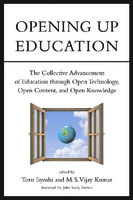Opening Up Education
The Collective Advancement of Education through Open Technology, Open Content, and Open Knowledge
| dc.contributor.editor | Iiyoshi, Toru | |
| dc.contributor.editor | Kumar, M.S. Vijay | |
| dc.date.accessioned | 2019-01-21 11:52:21 | |
| dc.date.accessioned | 2020-04-01T10:58:39Z | |
| dc.date.available | 2020-04-01T10:58:39Z | |
| dc.date.issued | 2010 | |
| dc.identifier | 1004016 | |
| dc.identifier | OCN: 1100489486 | en_US |
| dc.identifier.uri | http://library.oapen.org/handle/20.500.12657/26069 | |
| dc.description.abstract | Experts discuss the potential for open education tools, resources, and knowledge to transform the economics and ecology of education.Given the abundance of open education initiatives that aim to make educational assets freely available online, the time seems ripe to explore the potential of open education to transform the economics and ecology of education. Despite the diversity of tools and resources already available—from well-packaged course materials to simple games, for students, self-learners, faculty, and educational institutions—we have yet to take full advantage of shared knowledge about how these are being used, what local innovations are emerging, and how to learn from and build on the experiences of others. Opening Up Education argues that we must develop not only the technical capability but also the intellectual capacity for transforming tacit pedagogical knowledge into commonly usable and visible knowledge: by providing incentives for faculty to use (and contribute to) open education goods, and by looking beyond institutional boundaries to connect a variety of settings and open source entrepreneurs. These essays by leaders in open education describe successes, challenges, and opportunies they have found in a range of open education initiatives. They approach—from both macro and micro perspectives—the central question of how open education tools, resources, and knowledge can improve the quality of education. The contributors (from leading foundations, academic institutions, associations, and projects) discuss the strategic underpinnings of their efforts first in terms of technology, then content, and finally knowledge. They also address the impact of their projects, and how close they come to achieving a vision of sustainable, transformative educational opportunities that amounts to much more than pervasive technology.Through the support of the Carnegie Foundation for the Advancement of Teaching, an electronic version of this book is openly available under a Creative Commons license at The MIT Press Web site, http://mitpress.mit.edu. ContributorsRichard Baraniuk, Randy Bass, Trent Batson, Dan Bernstein, John Seely Brown, Barbara Cambridge, Tom Carey, Catherine Casserly, Bernadine Chuck Fong, Ira Fuchs, Richard Gale, Mia Garlick, Gerard Hanley, Diane Harley, Mary Huber, Pat Hutchings, Toru Iiyoshi, David Kahle, M. S. Vijay Kumar, Andy Lane, Diana Laurillard, Stuart Lee, Steve Lerman, Marilyn Lombardi, Phil Long, Clifford Lynch, Christopher Mackie, Anne Margulies, Owen McGrath, Flora McMartin, Shigeru Miyagawa, Diana Oblinger, Neeru Paharia, Cheryl Richardson, Marshall Smith, Candace Thille, Edward Walker, David Wiley | |
| dc.language | English | |
| dc.subject.classification | thema EDItEUR::J Society and Social Sciences::JN Education::JNM Higher education, tertiary education | en_US |
| dc.subject.classification | thema EDItEUR::J Society and Social Sciences::JN Education::JNV Educational equipment and technology, computer-aided learning (CAL) | en_US |
| dc.subject.other | education | |
| dc.title | Opening Up Education | |
| dc.title.alternative | The Collective Advancement of Education through Open Technology, Open Content, and Open Knowledge | |
| dc.type | book | |
| oapen.relation.isPublishedBy | f49dea23-efb1-407d-8ac0-6ed2b5cb4b74 | |
| oapen.relation.isbn | 9780262515016 | |
| oapen.pages | 504 | |
| oapen.place.publication | Cambridge | |
| oapen.remark.public | 21-7-2020 - No DOI registered in CrossRef for ISBN 9780262033718 | |
| oapen.identifier.ocn | 1100489486 |

